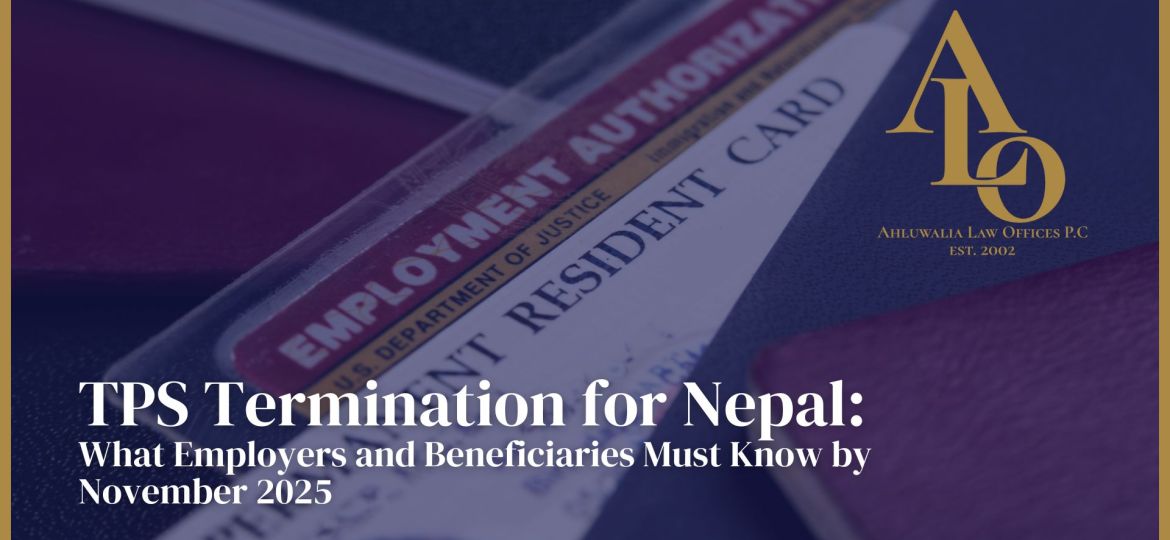
On August 4, 2025, U.S. Citizenship and Immigration Services (USCIS) updated its website to reflect critical changes to the Temporary Protected Status (TPS) designation for Nepal. In alignment with the Department of Homeland Security (DHS) notice published in the Federal Register, TPS for Nepal officially terminates effective August 5, 2025.
While this termination marks a significant shift, USCIS has confirmed automatic extensions of work authorization through November 18, 2025, giving both employers and beneficiaries some time to prepare. Below, we break down what this means for TPS holders from Nepal and the employers who rely on their talent.
What This Means for TPS Beneficiaries from Nepal
If you are a TPS holder from Nepal with an Employment Authorization Document (EAD) bearing category code A12 or C19, and the card shows an expiration date of:
- June 24, 2018
- June 24, 2019
- March 24, 2020
- January 4, 2021
- October 4, 2021
- December 31, 2022
- June 30, 2024
- June 24, 2025
Your work authorization is now automatically extended through November 18, 2025.
Important: While you can continue working, your TPS designation is ending. You should urgently explore alternate immigration options, including employment-based or family-based visas, change of status, or other lawful pathways. Speak to qualified immigration counsel as soon as possible.
Key Dates to Remember
| Event | Date |
|---|---|
| TPS Termination Effective Date | August 5, 2025 |
| EAD Auto-Extension Valid Through | November 18, 2025 |
| Deadline for Employers to Reverify Form I-9 | Before November 18, 2025 |
Employer Guidance: Form I-9 & E-Verify
Employers must take immediate steps to comply with federal requirements:
Form I-9 Reverification
- Reverify Form I-9 for any employee with a TPS-based EAD that expired on August 5, 2025.
- Accept the expired EAD along with a printout from the USCIS TPS for Nepal webpage (showing the auto-extension through November 18, 2025).
- Attach the printout to the employee’s I-9 as supporting documentation.
- Keep a record of the USCIS.gov URL and date printed for audit trail purposes.
E-Verify Updates
If you are enrolled in E-Verify:
- Use the Change of Status Reports to update employee records.
- Note that TPS beneficiaries with expiring EADs are still authorized to work through November 18, 2025.
Rehire Possibility
If any employees were recently let go due to the August 5, 2025 EAD expiration, they are now eligible for rehire through November 18, 2025. Employers may wish to consider bringing back valued employees under the auto-extension guidance.
After November 18, 2025: What Comes Next?
The automatic work authorization ends November 18, 2025. After this date:
- TPS holders will no longer have lawful status or work authorization under this designation.
- Employers must cease employment of TPS workers without alternative valid work authorization.
- Affected employees must have secured another immigration status or depart the U.S.
Legal Pathways & Next Steps
The termination of TPS does not mean the end of all options. Individuals are encouraged to explore:
- Adjustment of status through family or employment
- Nonimmigrant visas such as F-1 (student), H-1B (specialty worker), or B-2 (visitor)
- Humanitarian options (e.g., asylum, DED, or other protections)
Final Recommendations for Employers
- Conduct a compliance review of all current employees who are Nepali TPS holders.
- Create a timeline for reverification.
- Educate HR and operations teams on the Form I-9 and E-Verify procedures.
- Work closely with counsel to ensure a smooth transition and to evaluate workforce impact.
For continued updates and strategic immigration advice for businesses and individuals, contact Ahluwalia Law Offices, P.C. Our firm remains committed to guiding our community through complex changes in U.S. immigration law.


